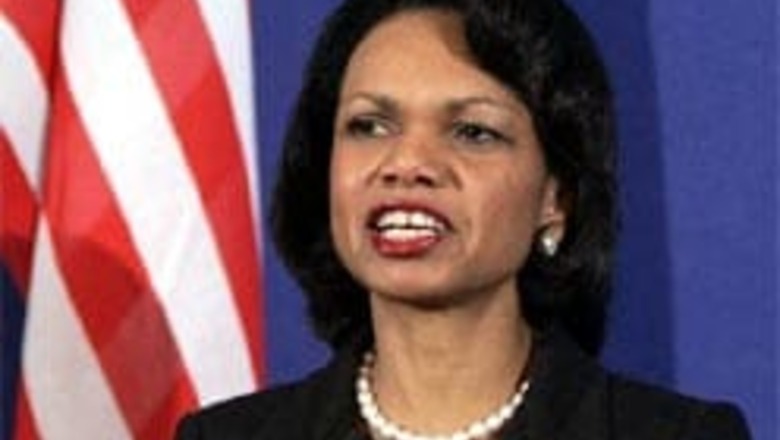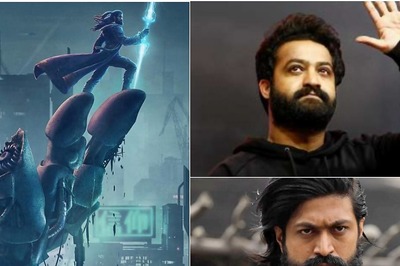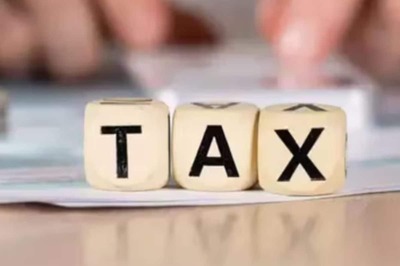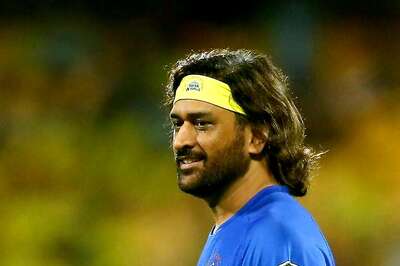
views
New Delhi: US Secretary of State Condoleezza Rice was due in New Delhi on Wednesday as part of intense US efforts to ease tension between India and Pakistan that has surged over the Mumbai attacks. The top US military commander was also visiting the nuclear-armed south Asian rivals and India's senior-most diplomat held meetings in Washington in other initiatives.
The 10 gunmen who killed 183 people in a three-day rampage in India's financial capital last week were from a Pakistani terrorist group, investigators said.
The deterioration in ties could put US counterterrorism efforts in the region at risk -- Islamabad has said the tensions may force it to shift troops from operations against al Qaeda militants on the Afghanistan border to the frontier with India.
Rice cut short a European tour to meet Prime Minister Manmohan Singh, who is under election-year pressure to craft a muscular response to opposition criticism his ruling Congress party is weak on security. Navy Admiral Mike Mullen, chairman of the US Joint Chiefs of Staff, would also visit the region starting Wednesday, officials said. They declined to give specific details.
"The chairman intends to meet with civilian and military leaders of both nations to encourage a cooperative approach to regional security concerns in the wake of the Mumbai attacks," Navy Capt. John Kirby, a spokesman for Mullen, said by e-mail.
"He believes the attacks, which also killed Americans, point to a growing sophistication of extremist groups that threaten the entire region." India's Foreign Secretary Shivshankar Menon met Deputy Secretary of State John Negroponte and other officials in Washington on Tuesday.
"They discussed our continuing cooperation to find and bring to justice the perpetrators of the Mumbai attacks," State Department spokesman Gordon Duguid said.
Indian Foreign Minister Pranab Mukherjee said military action was not being considered but later warned a peace process begun in 2004 was at risk if Pakistan did not act decisively.
His Pakistani counterpart offered a joint probe to find the militants responsible for the killing spree in Mumbai. "We don't want to do anything in haste.
We don't want to do anything that fuels confrontation," Pakistani Foreign Minister Shah Mehmood Qureshi told reporters after an all-party meeting on relations with India. "We want to defuse the situation." Islamabad has yet to answer the demand for the fugitives. The United States, Britain and the European Union this week urged Pakistan's civilian government to cooperate with the probe.
Islamabad denied involvement and condemned the attacks, and has said it is battling the same kind of enemy at home. Mumbai's police chief Hasan Gafoor said the attackers had trained for a year or more in commando tactics. Azam Amir Kasav, the only gunmen of the 10 not killed by commandos, told investigators he is a Pakistani citizen from Punjab, Gafoor said. Investigators have said a former Pakistani army officer led the training, organised by the Pakistani Lashkar-e-Taiba group blamed for a 2001 attack on India's parliament. Ibrahim is said to be one of its financial backers. The 2001 attack nearly set off the fourth war between the two countries since Muslim Pakistan was carved from Hindu-majority India in 1947 after independence from Britain. US officials say the attacks bear the hallmarks of operations by groups like Lashkar-e-Taiba and Jaish-e-Mohammed, which have fought Indian rule in Kashmir.
"I don't think we can rule out al Qaeda, I just don't think we know at this point," a US official said on condition of anonymity.




















Comments
0 comment